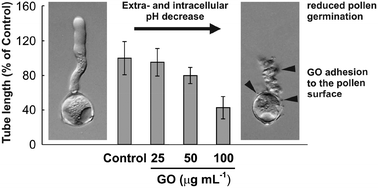Graphene oxide impairs the pollen performance of Nicotiana tabacum and Corylus avellana suggesting potential negative effects on the sexual reproduction of seed plants†
Abstract
The production of graphene based materials (GBMs) is steadily increasing but the effects of the possible release of GBMs in the environment are far from being understood. Graphene oxide (GO) is among the most active GBMs and it causes widely varying effects on the vegetative body of seed plants. However, nothing is known yet about its potential effects on the reproductive process. This study addresses the effects of GO on pollen germination and pollen tube elongation in the model species Nicotiana tabacum and in the non-model species Corylus avellana. In vitro germination experiments were conducted without or with GO (control and treated samples, respectively) at concentrations of 25, 50 and 100 μg mL−1. Pollen germination and tube elongation were affected at GO concentrations ≥50 μg mL−1, decreasing by 20% and 19% in N. tabacum and by 68% and 58% in C. avellana, respectively. GO did not affect the viability of N. tabacum pollen, but doubled the frequency of bent tubes. Microscopy observations of pollen tubes exposed to a cell-permeant, dual-excitation ratiometric pH indicator revealed that GO affected the intracellular pH homeostasis. Further germination experiments on C. avellana conducted by inverting the pH conditions of the control and treated (100 μg GO mL−1) samples demonstrated that the main factor influencing the pollen performance is the acidic properties of GO. This might affect the reproductive process of numerous seed plants thus being relevant from an environmental point of view.

- This article is part of the themed collection: ICEENN


 Please wait while we load your content...
Please wait while we load your content...